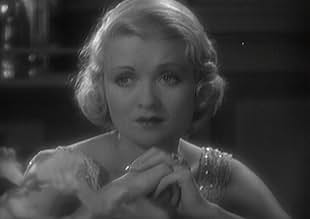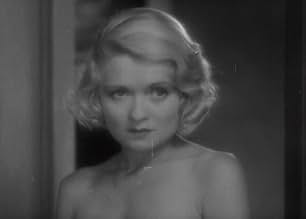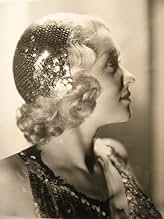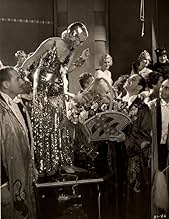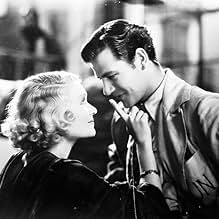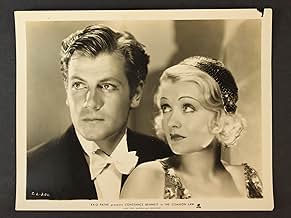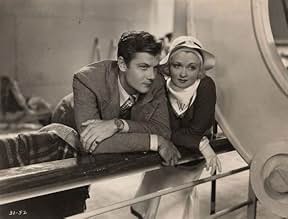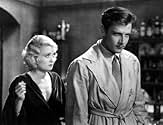Agrega una trama en tu idiomaYoung Valerie models for an American painter who tries to make a future in Paris and they fall in love.Young Valerie models for an American painter who tries to make a future in Paris and they fall in love.Young Valerie models for an American painter who tries to make a future in Paris and they fall in love.
- Dirección
- Guionistas
- Elenco
Emile Chautard
- Doorman
- (sin créditos)
Albert Conti
- Strangeways Party Guest
- (sin créditos)
Carrie Daumery
- Strangeways Party Guest
- (sin créditos)
George Davis
- Charles - Dick's Butler
- (sin créditos)
Julia Swayne Gordon
- Mrs. Strangeways
- (sin créditos)
George Irving
- Doctor
- (sin créditos)
Dolores Murray
- Queen at the Ball
- (sin créditos)
Tom Ricketts
- Elderly Strangeways Party Guest
- (sin créditos)
Marshall Ruth
- Strangeways Party Guest
- (sin créditos)
- Dirección
- Guionistas
- Todo el elenco y el equipo
- Producción, taquilla y más en IMDbPro
Opiniones destacadas
... because there is nothing at all remarkable about the plot. At the beginning of the film Valerie West (Constance Bennett) is seen packing a bag, ending a "common law" relationship with Dick Carmedon (Lew Cody) as he tells her she will have only prostitution to fall back on if she leaves him. Nothing keeps a gal from leaving you like telling her you have such a high opinion of her! Valerie's reply is "That gives me an idea". (HOW???) and she takes a job as a model for an artist, John Neville (Joel McCrea). It's a nude modeling job, and Valerie is shy about this. Probably the highlight of the film at that time (heck, now, too!) is a long shot that follows in which it appears you have a full nude side view of Constance Bennett, but it is far enough and blurry enough that she must have had some kind of skin tight outfit on. The precode days had their limits you know! This has all the earmarks of any number of films in which rich guy (McCrea) falls for poor girl (Bennett) with shady past but good character while others (his sister, her old lover) try to undermine the situation and break them up. There are some things that distinguish it. One is Joel McCrea as an American in Paris who is not even trying to hide his natural western twang, which really comes out whenever he is playing the part angry It does get funny at times, especially when you meet the rest of his family - understanding dad and plotting sister - and realize that they don't sound western at all! Where on earth did this accent come from? I fault the director here, because McCrea had modern dress parts before and after this and was able to sound not so Western when the role required it.
Let me also commend Hedda Hopper here. She was great as McCrea's snobby sister who is smiling the whole time she is trying to manipulate Valerie out of her brother's life. She almost steals the show, but then nobody steals a show from Joel McCrea in my humble opinion!
Let me also commend Hedda Hopper here. She was great as McCrea's snobby sister who is smiling the whole time she is trying to manipulate Valerie out of her brother's life. She almost steals the show, but then nobody steals a show from Joel McCrea in my humble opinion!
A professionally made and superbly acted reflection of what respectability was considered to be at time when the old world gave way to our modern one. It's the familiar 'can love survive across the class divide' story but done with class.
My only criticism is that Paul Stein's direction is quite humourless and unemotional so it doesn't engage with you that easily. It's much more realistic than typical 1931 pictures but that lack of melodrama doesn't quite give this as much impact as some of its contemporaries. It is however a great time capsule reflecting the sexual and class based hypocrisies that prevailed at the time.
Another silly frustration for any red blooded male is Stein's habit of banishing his camera to the furthest darkest distance possible from Miss Bennett when she takes her clothes off, it's actually a lot more prudish than you might expect from a film about a nude model in 1931! Although she's not especially alluring or erotic, Constance Bennett is pretty fabulous in this. You can see why she commanded such a massive salary - her acting is outstanding, she's totally convincing, you're not watching an actress, you're watching Valerie, a real person, a fairly modern person whom you can really relate to and sympathise with today.
A real benefit in this is Robert Williams who injects just the right amount of good humour as McCrea's friend. Such a tragedy that he died before his career really took off - he would easily have been as good in those best friend roles Frank McHugh or Charles Ruggles monopolised and very likely, a leading man; such a shame. His cheerful nature adds a necessary lightness to this picture because as good as it is, it is a little cold and dry.
My only criticism is that Paul Stein's direction is quite humourless and unemotional so it doesn't engage with you that easily. It's much more realistic than typical 1931 pictures but that lack of melodrama doesn't quite give this as much impact as some of its contemporaries. It is however a great time capsule reflecting the sexual and class based hypocrisies that prevailed at the time.
Another silly frustration for any red blooded male is Stein's habit of banishing his camera to the furthest darkest distance possible from Miss Bennett when she takes her clothes off, it's actually a lot more prudish than you might expect from a film about a nude model in 1931! Although she's not especially alluring or erotic, Constance Bennett is pretty fabulous in this. You can see why she commanded such a massive salary - her acting is outstanding, she's totally convincing, you're not watching an actress, you're watching Valerie, a real person, a fairly modern person whom you can really relate to and sympathise with today.
A real benefit in this is Robert Williams who injects just the right amount of good humour as McCrea's friend. Such a tragedy that he died before his career really took off - he would easily have been as good in those best friend roles Frank McHugh or Charles Ruggles monopolised and very likely, a leading man; such a shame. His cheerful nature adds a necessary lightness to this picture because as good as it is, it is a little cold and dry.
This movie has a lot of interesting things to say about marriage. Primarily its message is that marriage is a social convention. Women get married because marriage offers "protection." The emphasis in this movie is on social protection: marriage will protect women from malicious social gossip and from other lecherous males.
John Neville (Joel McCrea) asks live-in girlfriend Valerie West (Constance Bennett) to marry him because he's "in love." She says she wants to wait because she wants to be sure that their love will last. When she marries, she wants it "to be for keeps." As she says, "I'm really quite an old-fashioned girl -- well, with some modern decorations." Valerie soon changes her mind when John's sister (played by Hedda Hopper) arranges a boat cruise inviting his father (played by Walter Walker), her former lover (played by Lew Cody), and another girl interested in John. Unable to stand the social awkwardness, the gossip, and the blatant advances of her former beau, Valerie decides that perhaps getting married even though she's not sure it will last is the best way to go after all.
A critique about society's views of women and marriage, this movie also boasts strong performances by Hedda Hopper as John's sister and Walter Walker as John's father. Hedda is particularly good as the nasty, bitchy hypocrite Claire Collis, who does all she can to break John and Valerie up while feigning ignorance about it. Constance Bennett also gives a strong performance as Valerie.
Being that this was a pre-Code and Constance's character was supposed to be a nude model, I had hoped that they might have snuck in some flashes of skin. Unfortunately, they don't. Even the portraits of Constance nude cover up the private areas. There is some nudity in the film though, a long shot of a group of presumably naked women posing on a float during a raucous French party.
Given the performances and the interesting message the movie has, I'd give it a 7/10.
John Neville (Joel McCrea) asks live-in girlfriend Valerie West (Constance Bennett) to marry him because he's "in love." She says she wants to wait because she wants to be sure that their love will last. When she marries, she wants it "to be for keeps." As she says, "I'm really quite an old-fashioned girl -- well, with some modern decorations." Valerie soon changes her mind when John's sister (played by Hedda Hopper) arranges a boat cruise inviting his father (played by Walter Walker), her former lover (played by Lew Cody), and another girl interested in John. Unable to stand the social awkwardness, the gossip, and the blatant advances of her former beau, Valerie decides that perhaps getting married even though she's not sure it will last is the best way to go after all.
A critique about society's views of women and marriage, this movie also boasts strong performances by Hedda Hopper as John's sister and Walter Walker as John's father. Hedda is particularly good as the nasty, bitchy hypocrite Claire Collis, who does all she can to break John and Valerie up while feigning ignorance about it. Constance Bennett also gives a strong performance as Valerie.
Being that this was a pre-Code and Constance's character was supposed to be a nude model, I had hoped that they might have snuck in some flashes of skin. Unfortunately, they don't. Even the portraits of Constance nude cover up the private areas. There is some nudity in the film though, a long shot of a group of presumably naked women posing on a float during a raucous French party.
Given the performances and the interesting message the movie has, I'd give it a 7/10.
Joel McCrea plays an American artist living in Paris. He hires a woman (Constance Bennett) to be his nude model and eventually they fall in love. However, when he learns she has a tawdry past, he runs off to brood. Later, at debaucherous party, they meet once again. Soon, he asks her to marry him--she suggests they cohabitate to see if he really wants her. When the scandal of this relationship reaches his rich parents' ears, his mother schemes to pull the two lovers apart. However, in a strange scene, McCrea's on-screen father says that he heartily approves of the pair living together and wishes them the best! What happens next? See this odd film for yourself to find out for yourself.
If you haven't guessed, this film is CLEARLY an example of Pre-Code sensibilities. What I mean by that is that up until mid-1934, Hollywood's sense of morality was FAR looser than most folks would believe today. This was especially true from 1930-34--where adultery, premarital sex, violence, foul language, abortion and partial nudity were not terribly uncommon on the screen. But this moral code was not in line with America and soon folks started avoiding movies and ticket sales dropped. Soon, to lure back families, a strengthened Production Code was enforced--and films became, at times, a bit over-sanitized--but very family-friendly. Because of all this, there is zero chance this film could have been made after the Code was enforced--at least not without LOTS of revisions as well as a clear message that such immorality MUST be punished. But here in "The Common Law", the villains are NOT people who flaunt morality but the narrow-minded folks who don't approve and who, in some cases, are simply hypocrites! So is it worth seeing? Well, the film is well-acted and interesting. And, I do enjoy seeing many of the Pre-Code films because they are so strange and confusing--and entertaining!! So, I'd say this is very much worth seeing and a fine example of the genre.
If this isn't a plot that screams 'I'm a Pre-Code film!', nothing is!!
If you haven't guessed, this film is CLEARLY an example of Pre-Code sensibilities. What I mean by that is that up until mid-1934, Hollywood's sense of morality was FAR looser than most folks would believe today. This was especially true from 1930-34--where adultery, premarital sex, violence, foul language, abortion and partial nudity were not terribly uncommon on the screen. But this moral code was not in line with America and soon folks started avoiding movies and ticket sales dropped. Soon, to lure back families, a strengthened Production Code was enforced--and films became, at times, a bit over-sanitized--but very family-friendly. Because of all this, there is zero chance this film could have been made after the Code was enforced--at least not without LOTS of revisions as well as a clear message that such immorality MUST be punished. But here in "The Common Law", the villains are NOT people who flaunt morality but the narrow-minded folks who don't approve and who, in some cases, are simply hypocrites! So is it worth seeing? Well, the film is well-acted and interesting. And, I do enjoy seeing many of the Pre-Code films because they are so strange and confusing--and entertaining!! So, I'd say this is very much worth seeing and a fine example of the genre.
If this isn't a plot that screams 'I'm a Pre-Code film!', nothing is!!
It was said, possibly by David Niven, that Constance Bennett would walk into a room at night to play cards and emerge the next morning looking exactly the same as when she went in. I can believe it. Her beauty, glamor, and freshness are beautifully showcased in "The Common Law" about living and loving (freely) in Paris.
It seems strange that a movie made in 1931 should seem more modern than later films, but we can thank the Hayes code for that. In The Common Law, Bennett, when she's not shacking up with some guy, is a model for an artist, played by boyish Joel McCrea. The two fall in love, go through a breakup and reconcile. She is reticent about getting married. Then McCrea's conniving sister, having heard all the rumors, lures both she and McCrea back to America.
McCrea and Bennett made several films together, and they are a beautiful couple. He's big and wholesome; she's delicate and sophisticated. And of course, they're both incredibly beautiful.
It's always interesting to catch a pre-code movie, and The Common Law is a good one.
It seems strange that a movie made in 1931 should seem more modern than later films, but we can thank the Hayes code for that. In The Common Law, Bennett, when she's not shacking up with some guy, is a model for an artist, played by boyish Joel McCrea. The two fall in love, go through a breakup and reconcile. She is reticent about getting married. Then McCrea's conniving sister, having heard all the rumors, lures both she and McCrea back to America.
McCrea and Bennett made several films together, and they are a beautiful couple. He's big and wholesome; she's delicate and sophisticated. And of course, they're both incredibly beautiful.
It's always interesting to catch a pre-code movie, and The Common Law is a good one.
¿Sabías que…?
- TriviaThe screenplay was written by John Farrow. Five years later he married actress Maureen O'Sullivan, with whom he had seven children including actress Mia Farrow.
- Citas
John Neville Sr.: You're getting more like your mother every day.
Mrs. Claire Collis: I should think that would make you very happy.
John Neville Sr.: It does. And a little apprehensive.
- ConexionesFeatured in Thou Shalt Not: Sex, Sin and Censorship in Pre-Code Hollywood (2008)
Selecciones populares
Inicia sesión para calificar y agrega a la lista de videos para obtener recomendaciones personalizadas
Detalles
- Fecha de lanzamiento
- País de origen
- Idiomas
- También se conoce como
- Diosas de Montmartre
- Locaciones de filmación
- París, Francia(second unit, background and establishing shots)
- Productora
- Ver más créditos de la compañía en IMDbPro
Taquilla
- Presupuesto
- USD 339,000 (estimado)
- Tiempo de ejecución1 hora 14 minutos
- Color
Contribuir a esta página
Sugiere una edición o agrega el contenido que falta

Principales brechas de datos
By what name was The Common Law (1931) officially released in India in English?
Responda
